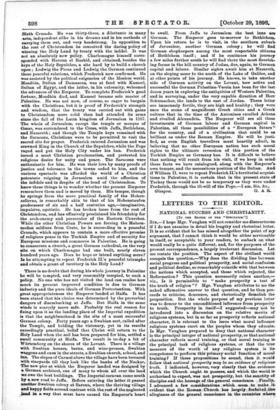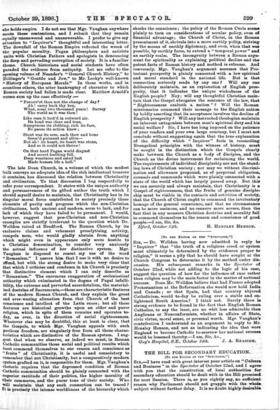LETTERS TO THE EDITOR.
NATIONAL SUCCESS AND CHRISTIANITY.
[To THE EDITOE Or THE "SpEcThron.-3 SIR,—I hope Mgr. Vaughan will not consider me discourteous, if I do not examine in detail his lengthy and rhetorical letter._ It is so evident that he has missed altogether the point of my argument, that I cannot think it world be either serviceable- in itself, or acceptable to your readers, to embark on what would really be a quite different, and, for the purposes of the- present correspondence, a largely irrelevant discussion. Let, me restate the position. The aspect of the civilised world) compels the question,—Why does the dividing line between social progress and political prosperity, and social confusion, and political decline, so remarkably coincide with that between the nations which accepted, and those which rejected, the Reformation P This question necessarily raises another,— viz., Is it permissible to " make prosperity a test of the truth of religion "? Mgr. Vaughan attributes to me the naked affirmative answer to that question, and be then pro-- ceeds to criticise, denounce, and rhetorically demolish the proposition. But the whole purpose of my previous letter was to demur to the unconditioned inference from prosperity to truth. Prosperity in itself—I suggested—may not be introduced into a discussion on the relative merits of- religious systems, but in so far as prosperity reflects national character, it is relevant to the issue what moral influence- religious systems exert on the peoples whom they educate.. Is Mgr. Vaughan prepared to deny that national character- is the principal integer of national prosperity, or that nationab character reflects moral training, or that moral training is• the principal task of religious systems, or that the true measure of the worth of any religious system is its- competence to perform this primary social function of moral training? If these propositions be sound, then it would follow that national prosperity may be an evidence of religious' truth. I indicated, however, very clearly that the evidence which the Church ought to possess, and which the world is• authorised to expect, was not prosperity, but the sanctity of disciples and the homage of the general conscience. Finally, I advanced a few considerations which seem to make it that the Roman Church has largely forfeited the allegiance of the general conscience in the countries where ,she holds empire. I do not see that Mgr. Vaughan anywhere
meets these oontentions, and I submit that they remain ,equally unanswered and unanswerable. I prefer to give my Attention to "Inquirer's" thoughtful and interesting letter. The downfall of the Roman Empire reflected the wreck of the popular morality. Pagan philosophers and satirists unite with Christian Fathers and apologists in denouncing the deep and pervading corruption of society. It is a familiar theme. Church historians and social students have often paraded the evidence from antiquity. Let me refer to the
.opening volume of Neander's " General Church History," to Dollinger's " Gentile and Jew," to Mr. Lecky's well-known 4' History of European Morals." In these works, and in countless others, the utter bankruptcy of character to which
Roman society had fallen is made clear. Matthew Arnold's verses sum up the case effectively :—
"Perceiv'st thou not the change of day?
Ah ! carry back thy ken, What, some two thousand years! Survey The world as it was then !
Like ours it look'd in outward air. Its head was clear and true, Sumptuous its clothing, rich its faro, No pause its action knew ;
Stout was its arm, each thew and bone Seem'd puissant and alive—
But ah ! its heart, its heart was stone, And so it could not thrive !
On that hard Pagan world disgust And secret loathing fell. Deep weariness and sated lust Made human life a hell."
The late Dean Church, in a volume of which the modest hulk conveys no adequate idea.of the rich intellectual treasure it contains, has discussed the relation between Christianity and civilisation. To that discussion I beg respectfully to
refer your correspondent. It states with the unique authority and persuasiveness of its gifted author the truth which I should myself desire to maintain, that Christianity has in its singular moral force contributed to society precisely those elements of purity and progress which the non-Christian civilisations, both ancient and modern, seem to lack, and for lack of which they have failed to be permanent. I would, however, suggest that pm-Christian and non-Christian examples are strictly irrelevant to the question which Dr.
Welldon raised at Bradford. The Roman Church, by its
exclusive claims and vehement proselytising activity, compels men, who would gladly abstain from anything which might even in appearance only seem hostile to a Christian denomination, to consider very anxiously the actual influence of her distinctive system. Mgr.
Vaughan is disposed to resent my use of the word Romanism." I assure him that I use it with no desire to offend, but with the strong desire to make very clear that that which I criticise and condemn in his Church is precisely that distinctive element which I can only describe as " Romanism." The enormous exaggeration of ecclesiastical authority which culminated in the dogma of Papal infalli- bility, the extreme and perverted sacerdotalism, the material.
ised doctrine of Sacraments,—these are characteristic features of the modern Roman Church, and they explain the great and ever-waving alienation from that Church of the best
conscience and intellect of the Latin races; but all these features are historical growths upon an older and purer religion, which in spite of them remains and operates to- day, as ever, in the direction of social righteousness.
Whatever else may be doubtful, this at least is clear, that the Gospels, to which Mgr. Vaughan appeals with such Perilous freedom, are singularly free from all those charac- teristics which are distinctive of the Roman system. I sug- gest that when we observe, as indeed we must, in Roman Catholic communities those social and political results which least commend themselves to our reason and conscience as " fruits " of Christianity, it is useful and consolatory to remember that not Christianity, but a comparatively modern system grafted on it, is responsible for them. Mgr. Vaughan's rhetoric requires that the depressed condition of Roman Catholic communities should be plainly connected with the
-superior rectitude of their politics, the higher morality of their commerce, and the purer tone of their society. Who
will maintain that any suoh connection can be traced ? It is precisely the intense worldliness of the hierarchy which
shocks the conscience; the policy of the Roman Curia seems plainly to turn on considerations of secular policy, even of financial advantage; the Church of Christ, in the Roman presentment of it, shrivels into a mere earthly polity, striving by the means of earthly diplomacy, and even, when that was possible, by earthly force, to extend a " temporal power" and an earthly realm. The incongruity between a Roman argu- ment for spirituality as explaining political decline and the patent facts of Roman history and method is extreme. And conversely, Mgr. Vaughan's argument assumes that Pro- testant prosperity is plainly connected with a low spiritual and moral standard in the national life. But is that connection seriously made by any one ? Will any one deliberately maintain, as an explanation of English pros- perity, that it indicates the unique wickedness of the English people ? Nay ; will any thoughtful Christian main- tain that the Gospel abrogates the sentence of the law, that " Righteousness exalteth a nation " ? Will the Roman missionaries commend their message to the English nation by boldly asserting that its acceptance involves the decline of English prosperity ? Will any instructed theologian maintain an inherent antagonism between man's spiritual duty and his social welfare ? Sir, I have too long imposed on the patience of your readers and your own large courtesy, but I must not conclude without suggesting again that the true explanation of the difficulty which " Inquirer" feels in reconciling Evangelical principles with the witness of history, must be sought in the distinction which the Gospels clearly make between the Church as a body of disciples, and the Church as the divine instrument for reclaiming the world. The requirements of individual discipleship are not the stand. ing laws of Christian society ; nor may we without discrimi. nation and allowance propound, as of perpetual obligation, counsels and commands which were plainly connected with a state of the world which has largely passed away. But this we can securely and always maintain, that Christianity is a Gospel of righteousness, that the fruits of genuine disciple- ship must be visible in the contacts and activities of society, that the Church of Christ ought to command the involuntary homage of the general conscience, and that no circumstance can be more ominous, and no censure more severe, than the fact that in any measure Christian doctrine and morality fail to commend themselves to the reason and conscience of good people.—I am, Sir, &c.







































 Previous page
Previous page